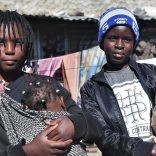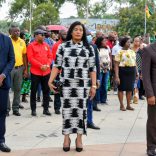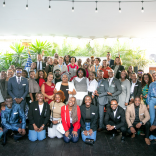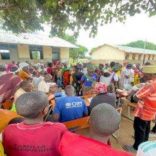Mozambique: In Nampula province, 18% of girls marry before 15, 56% before 18 — UNICEF
Joint Opinion Article – High-Level Political Dialogue Group on Child and Forced Marriages (CEFM)

Image: High-Level Political Dialogue Group on Child and Forced Marriages
To the Political Leaders and the Mozambican Society,
Today, December 10th, we celebrate International Human Rights Day and close the 16 Days of Activism against Gender-Based Violence (GBV) campaign. We also commemorate an important milestone for Mozambique: the 5th anniversary of the Law to Prevent and Combat Premature and Forced Unions, approved in October 2019. This law represented historic progress, symbolizing Mozambique’s commitment to protecting the future of girls. However, five years later, despite the existence of a legal framework, there is still a long way to go for this commitment to be translated into reality. Premature and forced unions continue to limit and destroy the lives of many girls, compromising their health, safety and potential.
According to the National Institute of Statistics (INE), four out of ten girls have already been involved in a premature union before turning 18. This makes Mozambique one of the countries that has one of the highest rates of premature unions in the world. Evidence shows that the situation is most dramatic in the conflict-affected areas. In Cabo Delgado, girls are seven times more likely to be forced into a union before the age of 18, compared to Maputo City.The girls we have talked to throughout the country give face to this statistic. From the stories we
heard, we realized how they are deprived of their childhood, the right to education and the opportunity to build their future. In girls who have managed to escape these unions, we feel the desire to overcome their limitations by continuing to invest in their education and looking for ways to strengthen their income. Premature unions not only violates human rights, but perpetuates the cycle of poverty, undermines social progress and impedes economic development. The country already has the legal basis, however there are still areas for improvement, strict compliance and strong political will is needed to ensure that this law is effectively implemented throughout the country.
At the same time that five years have passed since the approval of the Law to Prevent and Combat Premature and Forced Unions, more than 20 years have also passed since the adoption of the African Charter on Human and Peoples’ Rights on the Rights of Women in Africa (Maputo Protocol), which defines norms that States must follow in the promotion and protection of women’s rights. It is noted that in the last five years, the country has faced major obstacles that have had a significant impact on girls’ lives, such as cyclones Idai and Kenneth, the COVID-19 pandemic and conflicts in Cabo Delgado. These crises have increased poverty and instability, leading more families to resort to child marriage as a way to survive. This emphasizes the fact that in times of crisis, the most vulnerable are hit.
The High-Level Political Dialogue Group on Child and Forced Unions is an informal group of Ambassadors and High Commissioners, committed to supporting the Government of Mozambique in its efforts to combat child and forced unions, through targeted advocacy and political dialogue. We would like to call on the Political Mozambican Leaders and Society, so that they assume the commitment to the full implementation of the Law as a priority. The time has come to amplify the impact of the Law, prioritizing the following points:
Raising Public Awareness and Education: In many communities, premature and forced unions persist due to deep-rooted cultural norms and a lack of knowledge about the legal implications. National campaigns need to go further, reaching remote and high-risk areas, with culturally sensitive context-appropriate messages to educate communities about the harmful consequences of these child marriages. The law can only be effective when communities understand and support it.
Strengthening the Role of Local Leaders, Religious Leaders and Traditional Authorities: Traditional, community, and religious leaders have great influence in their communities. There have already been some important efforts made by religious leaders to influence against early marriage, which is extremely important and should continue to be encouraged. Continue engaging them as allies in the fight against premature and forced unions can be transformative, providing them with resources and training to become advocates against these unions. Their voices can be powerful in changing attitudes.
Expanding Access to Education for Girls: Education is key to ending child and forced marriages. However, millions of Mozambican girls do not have access to school due to socio-cultural and economic issues. Safe and affordable education options must be invested in, especially for girls in rural and conflict-affected areas. Also, incentives such as financial support and scholarships for school participation and graduation should be considered. Every year that a girl stays in school is another year that avoids early marriage.
Strengthen Victim Protection and Support Services: Girls forced into unions must have access to justice, health services, and counseling. Safe shelters, legal aid, and psychosocial support services should be widely available, especially in high-incidence areas. Creating safe spaces and increasing the number of professionals trained to deal with cases of premature and forced unions are essential for effective implementation of the law.
Increasing Resources for Law Enforcement and Judicial Proceedings: Despite the existence of the law, its enforcement remains weak in many regions of the country. To reverse this trend, it is necessary to ensure that law enforcement officials and members of the judiciary are properly trained and equipped to handle these cases. Police, prosecutors, and judges must have the tools and knowledge necessary to prioritize and handle cases with urgency and sensitivity.
Ending child and forced unions means giving every girl the opportunity to live in safety, to fulfil her dreams, to achieve her goals and to contribute to the development of society. Girls in Mozambique count on everyone to ensure that their rights are protected in order to guarantee their future. A nation that invests in girls is a nation that invests in a prosperous and equitable future.
To conclude, given the current political situation in the country, we would like to call on all the parties involved to consider gender equality as fundamental to reaching a peaceful resolution through dialogue for the purpose of national unity, the country’s development and the wellbeing and welfare of the Mozambican people.
- Elsbeth Akkerman, Ambassador of the Kingdom of the Netherlands to Mozambique
- Helen Lewis, British High Commissioner for the Republic of Mozambique
- Mette Sunnergren, Ambassador of Sweden to Mozambique
- Noora Rikalainen, Chargé d’Affaires of the Embassy of Finland in Mozambique
- Sara Nicholls, High Commissioner of Canada to Mozambique












Leave a Reply
Be the First to Comment!
You must be logged in to post a comment.
You must be logged in to post a comment.